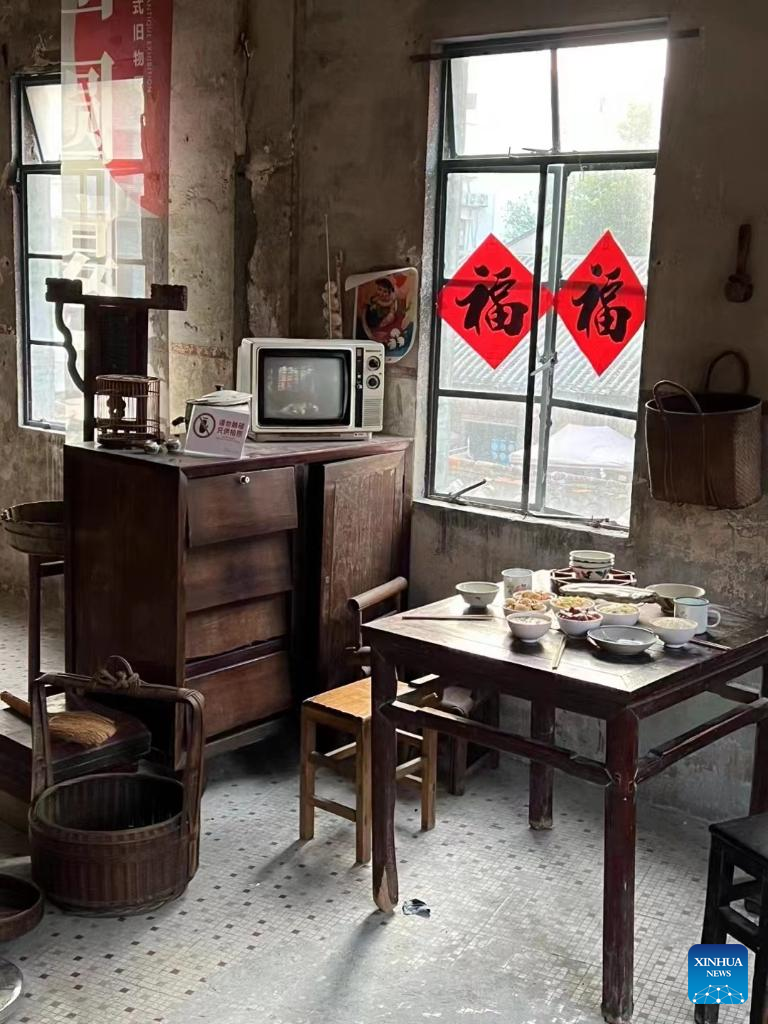
This photo taken on Jan. 8, 2023 shows the second-hand items exhibition set up by Wu Kaisi in Guangzhou, south China's Guangdong Province. (Photo by Wu Kaisi/Xinhua)
BEIJING, Jan. 25 (Xinhua) -- Ye Yunxin, a 26-year-old Shanghai resident, shared an interesting fact that one can find a deserted mattress on the city's street every day if he or she observes as carefully as possible.
"Stooping," what Ye is now enthusiastic about, has become trendy in New York as early as 2019, owing to a couple who posted pictures of free items left on the street on Instagram. Such a neglected waste of resources has since then drawn many to join the green trash picking campaign, following their belief that "One man's trash is another man's treasure."
Though Ye, who had studied overseas before, knew well about the popular stooping, she still felt a little bit uneasy about telling her friends she is a stooping fanatic at first.
"I was kind of worried that they would make judgments because, in China, the majority would consider people scavenging rubbish as indecent or poor," she explained.
To help change the usual stereotype, Ye established a new account on Xiaohongshu, or Little Red Book, China's lifestyle-focused social media platform, for her latest posts on stooping.
On June 30, 2022, she posted her first stooping content, in which an intact bathtub was abandoned aside the street. Ye labeled the picture with phrases like "free to go home" and "let resources be recycled."
Within a month, her friend invited her to a flash mob, which encouraged people to pick up old pieces of furniture in a man's house as he no longer needed them. It was a surprise for the friend to find that Ye was the actual organizer of the activity.
Later on, fans for stooping in China grow rapidly. A flood of followers tipping 30,000 subscribed to her account within half a year, making Ye among the very first to introduce the campaign to Shanghai.
Besides her own stooping efforts, Ye also posts others' stooping fruits like an old pillar of certain aesthetic value. She remembers the joy of an elderly couple who found an IKEA cabinet on the street because the couple were unable to afford a new piece of furniture at that time.
"At first, it was only about adding some fun to my life in Shanghai. I love the place so much that I want to explore something special about Shanghai," recalled Ye. "Later on, I began to notice how I can impact the young, such as stopping them from splurging on buying new things and ridding them of their stereotypes on second-hand items."
Aside from the stooping mania, an increasing number of new business models for better resource recycling and sustainable development have mushroomed in China, including thrift shops and vintage stores.
In Guangzhou, capital of south China's Guangdong Province, Wu Kaisi, 27, has been involved in the second-hand business since 2016, the year he graduated from college as a law student. "I am quite addicted to searching for old things, so I chose to develop my fondness into a lifelong career after graduation," he said.
Owning two thrift stores, he often purchases old items from the second-hand market or scavenges trash from rubbish bins on the streets. Many of the things he uses in daily life are also second-hand, such as clothes, his computer, and a mattress.
"I've done such things for years, and the behavior has just got its own name of 'stooping' recently. I'm glad that stooping is heatedly discussed in China because it can be a golden opportunity to allow the mass to recognize second-hand goods properly, spur the second-hand market and even optimize the country's recycling mechanism," Wu said.
Wu does more than just sell, but holds exhibitions on nostalgic items, helps casts find suitable props, as well as decorating old communities.
"My hunt for second-hand items is endless. I can always feel the thrill of finding something with special meaning among the idle objects," Wu said, adding that he was in ecstasy when he recently found an old newspaper that reported Argentina's World Cup championship in 1986. ■



